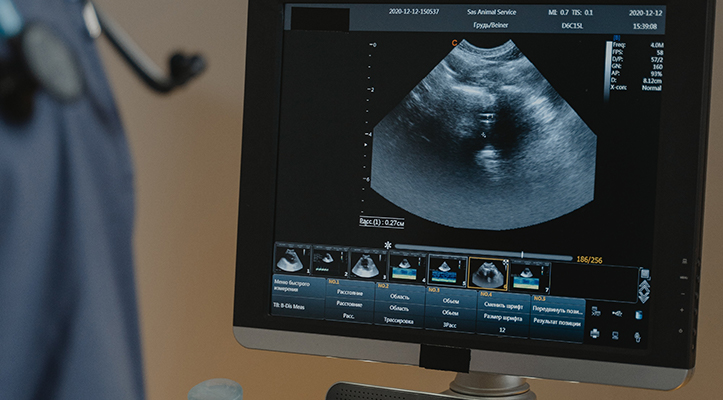
Diagnostics
When your pet is sick or injured, they can’t tell us what’s wrong. A thorough physical exam and history (symptoms you’ve noted at home) are the first important step. If the diagnosis is not immediately evident upon initial assessment, your veterinarian will recommend specific diagnostic tests. These may include:
- Laboratory testing for baseline blood counts and organ function tests, or infectious disease. Blood and/or urine samples may be collected from your pet, for point-of-care testing, or reference lab tests. Point-of-care tests are those tests that are done on-site in our hospital so as to be able to determine results and make treatment recommendations in the most timely fashion possible. In other cases, lab samples may need to be sent off to off-site laboratories (reference laboratories) – when the test cannot be performed with in-hospital lab equipment, or when the test results are not needed urgently.
- Imaging such as dog and cat x-rays or ultrasounds, which allows diagnosis of conditions of the heart and lungs, gastrointestinal obstruction, tumors of the internal organs or bones, fluid in the chest or abdominal cavity, urinary stones or gallstones, reproductive diseases, and bone/joint disorders. For most patients, gentle restraint can be used for these procedures, however, in some cases, sedation may be necessary.
- Microscopy is quite useful in the evaluation of lab samples such as ear swabs, skin impressions and scrapes, and needle biopsies of tumors. These tests are helpful in diagnosis of dermatologic and otic (ear) conditions.
- Ocular conditions or eye exams may warrant evaluation for tear production (Schirmer Tear Test), corneal injuries (fluorescein stain), or abnormal intra-ocular pressures (Tonometry).
Using Diagnostics to Treat Your Pet
Diagnostic testing is an important step in the development of a treatment plan for your pet, allowing your veterinarian to most effectively target the underlying problem(s) and assess the probability of successful treatment. Your veterinarian can explain the purpose of each diagnostic test for your pet, and help prioritize which tests may be most helpful in determining the cause of your pet’s illness.
Our Diagnostics tests can help find health issues that may be hidden. Contact us to make an appointment.
